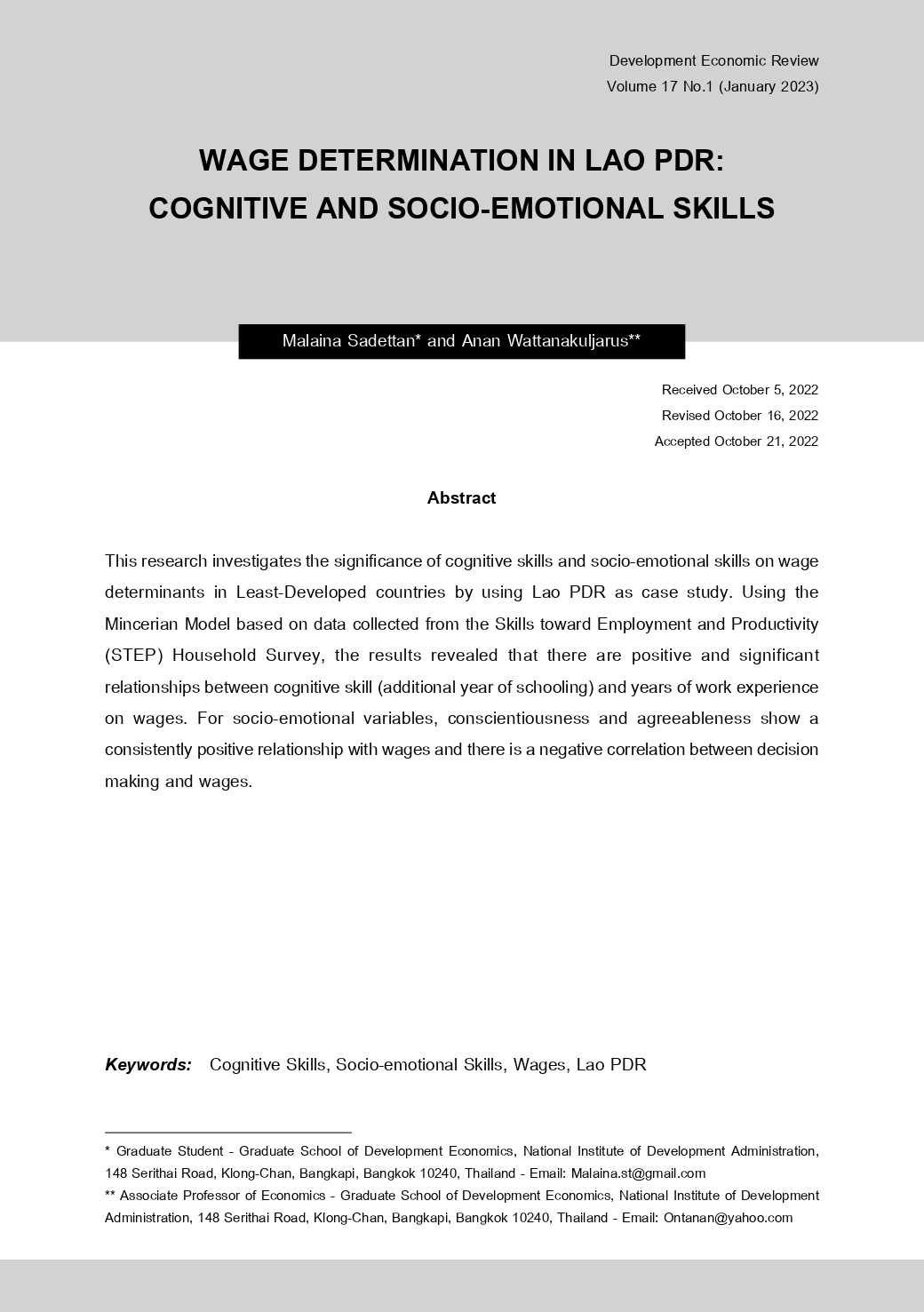WAGE DETERMINATION IN LAO PDR: COGNITIVE AND SOCIO-EMOTIONAL SKILLS
Keywords:
Cognitive Skills, Socio-emotional Skills, Wages, Lao PDRAbstract
This research investigates the significance of cognitive skills and socio-emotional skills in explaining wage variability in Least-Developed countries such as Lao PDR. The analysis is using an expanded Mincerian model based on data collected from the Skills toward Employment and Productivity (STEP) Household Survey which is a study conducted by the World Bank (2012). The results revealed that for a cognitive skill there are positive and significant relationships between an additional year of schooling, years of work experience and wages. For socio-emotional variables, conscientiousness and agreeableness show a consistently positive relationship with wages and there is a negative correlation between decision making and wages
References
Almlund, M., Duckworth, A. L., Heckman, J., & Kautz, T. (2011). Personality Psychology and Economics. In E. A. Hanushek, S. Machin, & L. Woessmann (Eds.), Handbook of the Economics of Education (Vol. 4, pp. 1-181): Elsevier.
Borghans, L., Duckworth, A. L., Heckman, J. J., & Weel, B. t. (2008). The Economics and Psychology of Personality Traits. Journal of Human Resources, 43(4), 972-1059.
Bowles, S., Gintis, H., & Osborne, M. (2001). The Determinants of Earnings: A Behavioral Approach. Journal of Economic Literature, 39(4), 1137-1176.
Díaz, J. J., Arias, O., & Tudela, D. V. (2013). Does Perseverance Pay as Much as Being Smart? The Returns to Cognitive and Non-Cognitive Skills in Urban Peru. Unpublished paper, World Bank, Washington, D.C.
Duckworth, A., Peterson, C., D Matthews, M., & R Kelly, D. (2007). Grit: Perseverance and Passion for Long-Term Goals (Vol. 92).
Filer, R. K. (1986). The Role of Personality and Tastes in Determining Occupational Structure. ILR Review, 39(3), 412-424. Retrieved from https://doi.org/10.1177/001979398603900308
Flossmann, A., Piatek, R., & Wichert, L. (2007). Going beyond returns to education: The role of noncognitive skills on wages in Germany.
Frank, R. H. (1984). Are Workers Paid their Marginal Products? The American Economic Review, 74(4), 549-571.
Goldberg, L. R. (1993). The structure of phenotypic personality traits. American Psychologist, 48(1), 26-34.
Heckman, J. J., Lochner, L. J., & Todd, P. E. (2003). Fifty Years of Mincer Earnings Regressions. National Bureau of Economic Research Working Paper Series, No. 9732.
Heckman, James J., Stixrud, J., & Urzua, S. (2006). The Effects of Cognitive and Noncognitive Abilities on Labor Market Outcomes and Social Behavior. Journal of Labor Economics, 24(3), 411-482.
Heineck, G., & Anger, S. (2010). The returns to cognitive abilities and personality traits in Germany. Labour Economics, 17(3), 535-546. Retrieved from http://www.sciencedirect.com/science/article/pii/S0927537109000670
Hilger, A., Nordman, C. J., & Sarr, L. R. (2018). Cognitive and Non-Cognitive Skills, Hiring Channels, and Wages in Bangladesh. IZA Discussion Paper No. 11578.
Hong-ngam, J. (2012). Effects of Cognitive and Non-cognitive Skills on Earning Outcomes: A Case of Khonkaen Province of Thailand. NIDA Economic Review, 6(2), 1-11.
John, O. P., & Srivastava, S. (1999). The Big Five Trait taxonomy: History, measurement, and theoretical perspectives. In Handbook of personality: Theory and research, 2nd ed. (pp. 102-138). New York, NY, US: Guilford Press.
Kautz, T., et al. (2014), "Fostering and Measuring Skills: Improving Cognitive and Non-cognitive Skills to Promote Lifetime Success", OECD Education Working Papers, No. 110, OECD Publishing, Paris, https://doi.org/10.1787/5jxsr7vr78f7-en
Lavado, P., Velarde, L., & Yamada, G. (2013). Cognitive and non-cognitive skills and wages: the role of latent abilities on the gender wage gap in Peru. Young Lives.
Mincer, J. (1958). Investment in Human Capital and Personal Income Distribution. Journal of Political Economy, 66(4), 281-302. Retrieved from https://doi.org/10.1086/258055
Neisser, U., Boodoo, G., Bouchard Jr, T. J., Boykin, A. W., Brody, N., Ceci, S. J., . . . Urbina, S. (1996). Intelligence: Knowns and unknowns. American Psychologist, 51(2), 77-101.
Nomura, S., & Adhikari, S. (2017). The influence of non-cognitive skills on wages within and between firms: evidence from Bangladesh's formal sector. World Bank Policy Research Working Paper, (8053).
Nyhus, E. K., & Pons, E. (2005). The effects of personality on earnings. Journal of Economic Psychology,26(3),363-384.Retrievedfrom http://www.sciencedirect.com/science/article/pii/S0167487004000546
Oaxaca, R. (1973). Male-Female Wage Differentials in Urban Labor Markets. International Economic Review, 14(3), 693-709. Retrieved from http://www.jstor.org/stable/2525981
OECD. (2015). Skills for Social Progress: The Power of Social and Emotional Skills, OECD Skills Studies. OECD Publishing.
Onphanhdala, P., & Suruga, T. (2006). Education and Earnings in Lao PDR: Regional and Gender Differences. GSICS Working Paper Series. KOBE UNIVERSITY,
Pablo Acosta Noël Muller Miguel Alonso, S. (2015). Beyond Qualifications: Returns to Cognitive and Socio-Emotional Skills in Colombia: The World Bank.
Pierre, G., Sanchez Puerta, M. L., Valerio, A., & Rajadel, T. (2014). STEP Skills Measurement Surveys : Innovative Tools for Assessing Skills. World Bank Group, Washington.
R. Mccrae, R., & Costa, P. (1996). Toward a new generation of personality theories: theoretical contexts for the Five-Factor Model.
Rossetti, S., & Tanda, P. (2000). Human Capital, Wages and Family Interactions. LABOUR, 14(1), 5-34. Retrieved from https://doi.org/10.1111/1467-9914.00122
Valerio, A., Puerta, M. L. S., Tognatta, N., & Monroy-Taborda, S. (2016 ). Are There Skills Payoffs in Low and Middle-Income Countries? Empirical Evidence Using STEP Data. Policy Research Working Paper, No. 7879.
Wang, Y. and G. Ruhe. (2007). “The Cognitive Process of Decision Making.” International Journal of Cognitive Informatics and Natural Intelligence 1 (2): 73-85.
Wannakrairoj, W. (2013). The effect of education and experience on wages: the case study of Thailand in 2012. Southeast Asian Journal of Economics, 1(1), 27-48.
World Bank. (2013). Lao People's Democratic Republic Skills & Knowledge for Greater Growth and Competitiveness in Lao PDR.

Downloads
Published
Issue
Section
License
Copyright to published manuscripts becomes the property of the Graduate School of Development Economics, National Institute of Development Administration. Reproduction of all or part of a Development Economic Review (DER) article by anyone, excluding author(s), is prohibited, unless receiving our permission.
Disclaimer: Opinions expressed in articles published in this journal are those of the author (s) and do nto necessarily represent opinions of the Graduate School of Development Economics, National Institute of Development Administration. Trade and proprietary names are only for identification and not constitute our endorsement.

